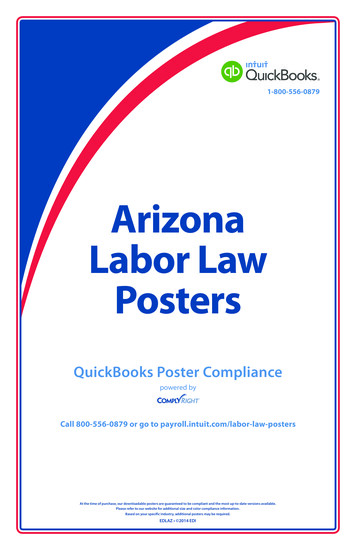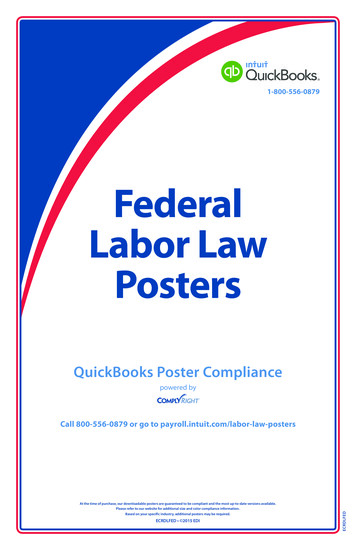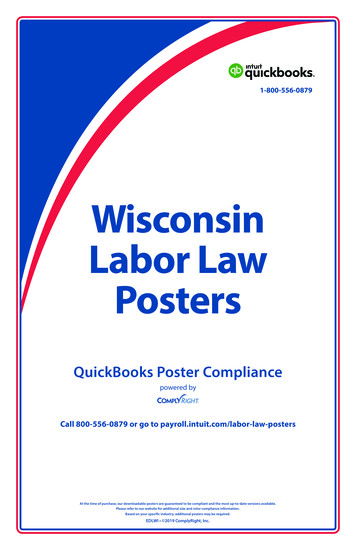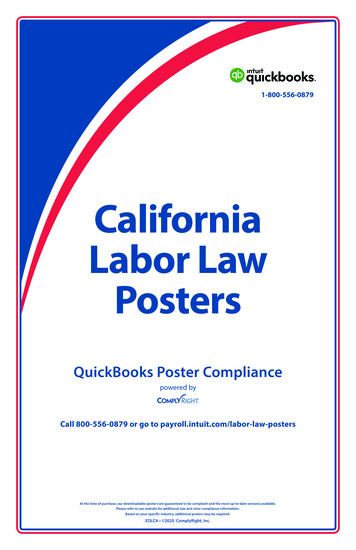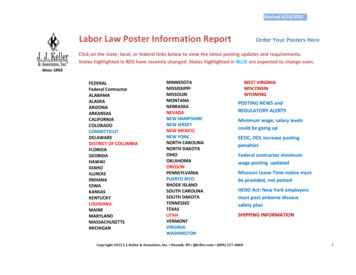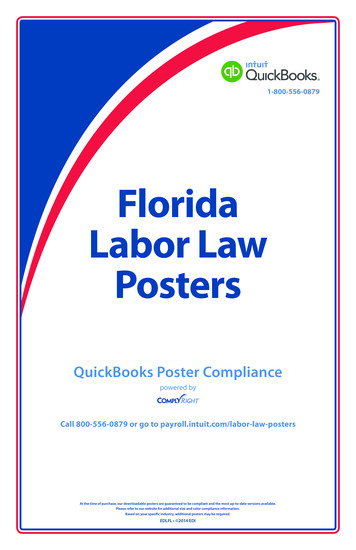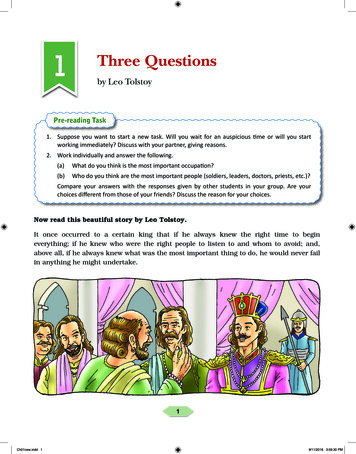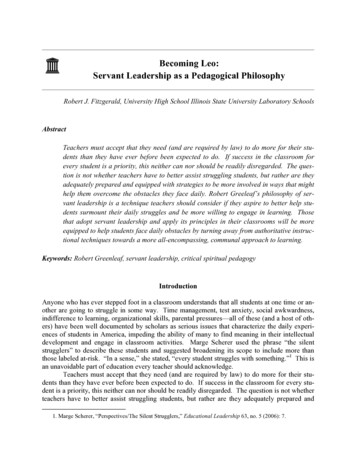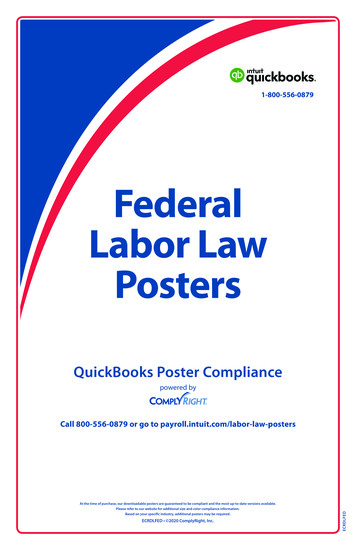
Transcription
1-800-556-0879FederalLabor LawPostersQuickBooks Poster Compliancepowered byAt the time of purchase, our downloadable posters are guaranteed to be compliant and the most up-to-date versions available.Please refer to our website for additional size and color compliance information.Based on your specific industry, additional posters may be required.ECRDLFED 2020 ComplyRight, Inc.ECRDLFEDCall 800-556-0879 or go to payroll.intuit.com/labor-law-posters
EEOC U.S. Equal Employment Opportunity CommissionEqual Employment Opportunity isTHE LAWPrivate Employers, State and Local Governments,Educational Institutions, Employment Agenciesand Labor OrganizationsApplicants to and employees of most private employers, state and localgovernments, educational institutions, employment agencies and labororganizations are protected under Federal law from discrimination on thefollowing bases: RACE, COLOR, RELIGION, SEX, NATIONAL ORIGINTitle VII of the Civil Rights Act of 1964, as amended, protects applicants andemployees from discrimination in hiring, promotion, discharge, pay, fringe benefits,job training, classification, referral, and other aspects of employment, on the basisof race, color, religion, sex (including pregnancy), or national origin. Religiousdiscrimination includes failing to reasonably accommodate an employee’s religiouspractices where the accommodation does not impose undue hardship. DISABILITYTitle I and Title V of the Americans with Disabilities Act of 1990, as amended,protect qualified individuals from discrimination on the basis of disability inhiring, promotion, discharge, pay, fringe benefits, job training, classification,referral, and other aspects of employment. Disability discrimination includes notmaking reasonable accommodation to the known physical or mental limitationsof an otherwise qualified individual with a disability who is an applicant oremployee, barring undue hardship. AGEThe Age Discrimination in Employment Act of 1967, as amended, protectsapplicants and employees 40 years of age or older from discrimination basedon age in hiring, promotion, discharge, pay, fringe benefits, job training,classification, referral, and other aspects of employment. SEX (WAGES)In addition to sex discrimination prohibited by Title VII of the Civil Rights Act,as amended, the Equal Pay Act of 1963, as amended, prohibits sex discriminationin the payment of wages to women and men performing substantially equalwork, in jobs that require equal skill, effort, and responsibility, under similarworking conditions, in the same establishment. GENETICSTitle II of the Genetic Information Nondiscrimination Act of 2008 protectsapplicants and employees from discrimination based on genetic informationin hiring, promotion, discharge, pay, fringe benefits, job training, classification,referral, and other aspects of employment. GINA also restricts employers’acquisition of genetic information and strictly limits disclosure of geneticinformation. Genetic information includes information about genetic tests ofapplicants, employees, or their family members; the manifestation of diseasesor disorders in family members (family medical history); and requests for orreceipt of genetic services by applicants, employees, or their family members. RETALIATIONAll of these Federal laws prohibit covered entities from retaliating againsta person who files a charge of discrimination, participates in a discriminationproceeding, or otherwise opposes an unlawful employment practice.WHAT TO DO IF YOU BELIEVE DISCRIMINATIONHAS OCCURREDThere are strict time limits for filing charges of employment discrimination.To preserve the ability of EEOC to act on your behalf and to protect your rightto file a private lawsuit, should you ultimately need to, you should contact EEOCpromptly when discrimination is suspected:The U.S. Equal EmploymentOpportunity Commission (EEOC), 1-800-669-4000 (toll-free) or 1-800-669-6820(toll-free TTY number for individuals with hearing impairments). EEOC field officeinformation is available at www.eeoc.gov or in most telephone directories in theU.S. Government or Federal Government section. Additional information aboutEEOC, including information about charge filing, is available at www.eeoc.gov.RACE, COLOR, RELIGION, SEX, NATIONAL ORIGINExecutive Order 11246, as amended, prohibits job discrimination on the basisof race, color, religion, sex or national origin, and requires affirmative action toensure equality of opportunity in all aspects of employment. INDIVIDUALS WITH DISABILITIESSection 503 of the Rehabilitation Act of 1973, as amended, protects qualifiedindividuals from discrimination on the basis of disability in hiring, promotion,discharge, pay, fringe benefits, job training, classification, referral, and otheraspects of employment. Disability discrimination includes not makingreasonable accommodation to the known physical or mental limitations of anotherwise qualified individual with a disability who is an applicant or employee,barring undue hardship. Section 503 also requires that Federal contractors takeaffirmative action to employ and advance in employment qualified individualswith disabilities at all levels of employment, including the executive level.DISABLED, RECENTLY SEPARATED, OTHER PROTECTED,AND ARMED FORCES SERVICE MEDAL VETERANSThe Vietnam Era Veterans’ Readjustment Assistance Act of 1974, as amended,38 U.S.C. 4212, prohibits job discrimination and requires affirmative action toemploy and advance in employment disabled veterans, recently separatedveterans (within three years of discharge or release from active duty), otherprotected veterans (veterans who served during a war or in a campaign orexpedition for which a campaign badge has been authorized), and Armed Forcesservice medal veterans (veterans who, while on active duty, participated in a U.S.military operation for which an Armed Forces service medal was awarded).RETALIATIONRetaliation is prohibited against a person who files a complaint of discrimination,participates in an OFCCP proceeding, or otherwise opposes discriminationunder these Federal laws.Any person who believes a contractor has violated its nondiscriminationor affirmative action obligations under the authorities above shouldcontact immediately:The Office of Federal Contract Compliance Programs (OFCCP), U.S.Department of Labor, 200 Constitution Avenue, N.W., Washington, D.C. 20210,1-800-397-6251 (toll-free) or (202) 693-1337 (TTY). OFCCP may also becontacted by e-mail at OFCCP-Public@dol.gov, or by calling an OFCCPregional or district office, listed in most telephone directories under U.S.Government, Department of Labor. Programs or Activities Receiving FederalFinancial AssistanceRACE, COLOR, NATIONAL ORIGIN, SEXIn addition to the protections of Title VII of the Civil Rights Act of 1964, as amended,Title VI of the Civil Rights Act of 1964, as amended, prohibits discrimination on thebasis of race, color or national origin in programs or activities receiving Federalfinancial assistance. Employment discrimination is covered by Title VI if the primaryobjective of the financial assistance is provision of employment, or whereemployment discrimination causes or may cause discrimination in providingservices under such programs.Title IX of the Education Amendments of 1972prohibits employment discrimination on the basis of sex in educational programsor activities which receive Federal financial assistance. INDIVIDUALS WITH DISABILITIESSection 504 of the Rehabilitation Act of 1973, as amended, prohibits employmentdiscrimination on the basis of disability in any program or activity which receivesFederal financial assistance. Discrimination is prohibited in all aspects ofemployment against persons with disabilities who, with or without reasonableaccommodation, can perform the essential functions of the job.If you believe you have been discriminated against in a program of any institutionwhich receives Federal financial assistance, you should immediately contact theFederal agency providing such assistance. Employers Holding Federal Contractsor Subcontracts Applicants to and employees of companies with a Federal governmentcontract or subcontract are protected under Federal law from discriminationon the following bases: EEOC 9/02 and OFCCP 8/08 Versions Useable With 11/09 SupplementEEOC-P/E-1 (Revised 11/09)ECRDLFED ECRDLEEOC 11/09
OSHA Occupational Safety and Health Act of 1970Job Safety and HealthIT’S THE LAW!All workers have the right to:Employers must:A safe workplace.Raise a safety or health concern withyour employer or OSHA, or report a workrelated injury or illness, without beingretaliated against.Receive information and training onjob hazards, including all hazardoussubstances in your workplace.Comply with all applicable OSHA standards.Request an OSHA inspection of yourworkplace if you believe there are unsafeor unhealthy conditions. OSHA will keepyour name confidential. You have theright to have a representative contactOSHA on your behalf.Participate (or have your representativeparticipate) in an OSHA inspection andspeak in private to the inspector.File a complaint with OSHA within30 days (by phone, online or by mail)if you have been retaliated against forusing your rights.See any OSHA citations issued toyour employer.Request copies of your medicalrecords, tests that measure hazardsin the workplace, and the workplaceinjury and illness log.Provide employees a workplace free fromrecognized hazards. It is illegal to retaliateagainst an employee for using any of theirrights under the law, including raising ahealth and safety concern with you orwith OSHA, or reporting a work-relatedinjury or illness.Report to OSHA all work-relatedfatalities within 8 hours, and all inpatienthospitalizations, amputations and lossesof an eye within 24 hours.Provide required training to all workersin a language and vocabulary they canunderstand.Prominently display this poster in theworkplace.Post OSHA citations at or near theplace of the alleged violations.FREE ASSISTANCE to identify and correcthazards is available to small and mediumsized employers, without citation or penalty,through OSHA-supported consultationprograms in every state.This poster is available free from OSHA.ECRDLFED1-800-321-OSHA (6742) TTY 1-877-889-5627 www.osha.govOSHA 3165-04R 2015Contact OSHA. We can help.ECRDLOSHA 05/16
EPPA Employee Polygraph Protection ActEMPLOYEE RIGHTSEMPLOYEE POLYGRAPH PROTECTION ACTThe Employee Polygraph Protection Actprohibits most private employers from usinglie detector tests either for pre-employmentscreening or during the course of employment.PROHIBITIONSEmployers are generally prohibited from requiring or requestingany employee or job applicant to take a lie detector test, and fromdischarging, disciplining, or discriminating against an employee orprospective employee for refusing to take a test or for exercising otherrights under the Act.EXEMPTIONSFederal, State and local governments are not affected by the law. Also,the law does not apply to tests given by the Federal Government tocertain private individuals engaged in national security-related activities.The Act permits polygraph (a kind of lie detector) tests to be administeredin the private sector, subject to restrictions, to certain prospectiveemployees of security service firms (armored car, alarm, and guard), andof pharmaceutical manufacturers, distributors and dispensers.The Act also permits polygraph testing, subject to restrictions, of certainemployees of private firms who are reasonably suspected of involvementin a workplace incident (theft, embezzlement, etc.) that resulted ineconomic loss to the employer.The law does not preempt any provision of any State or local law or anycollective bargaining agreement which is more restrictive with respect tolie detector tests.EXAMINEERIGHTSWhere polygraph tests are permitted, they are subject to numerous strictstandards concerning the conduct and length of the test. Examineeshave a number of specific rights, including the right to a written noticebefore testing, the right to refuse or discontinue a test, and the right notto have test results disclosed to unauthorized persons.ENFORCEMENTThe Secretary of Labor may bring court actions to restrain violations andassess civil penalties against violators. Employees or job applicants mayalso bring their own court actions.THE LAW REQUIRES EMPLOYERS TO DISPLAY THIS POSTERWHERE EMPLOYEES AND JOB APPLICANTS CAN READILY SEE IT.WAGE AND HOUR DIVISIONUNITED STATES DEPARTMENT OF LABOR1-866-487-9243TTY: 1-877-889-5627www.dol.gov/whdECRDLFEDWH1462 REV 07/16ECRDLEPPA 07/16
USERRA Uniformed Services Employment and Reemployment Rights Act YOUR RIGHTS UNDER USERRA THE UNIFORMED SERVICES EMPLOYMENT AND REEMPLOYMENT RIGHTS ACTUSERRA protects the job rights of individuals who voluntarily or involuntarily leave employmentpositions to undertake military service or certain types of service in the National DisasterMedical System. USERRA also prohibits employers from discriminating against past andpresent members of the uniformed services, and applicants to the uniformed services.REEMPLOYMENT RIGHTSHEALTH INSURANCE PROTECTIONYou have the right to be reemployed in your civilian jobif you leave that job to perform service in the uniformedservice and: If you leave your job to perform military service,you have the right to elect to continue your existingemployer-based health plan coverage for you and yourdependents for up to 24 months while in the military. you ensure that your employer receives advance writtenor verbal notice of your service; you have five years or less of cumulative service in theuniformed services while with that particular employer; you return to work or apply for reemployment ina timely manner after conclusion of service; and you have not been separated from service with adisqualifying discharge or under other than honorableconditions.ENFORCEMENT The U.S. Department of Labor, Veterans Employmentand Training Service (VETS) is authorized to investigateand resolve complaints of USERRA violations.If you are eligible to be reemployed, you must be restoredto the job and benefits you would have attained if you hadnot been absent due to military service or, in some cases,a comparable job. For assistance in filing a complaint, or for any other information on USERRA, contact VETS at 1-866-4-USA-DOLor visit its website at http://www.dol.gov/vets.An interactive online USERRA Advisor can be viewedat http://www.dol.gov/elaws/userra.htm.RIGHT TO BE FREE FROM DISCRIMINATIONAND RETALIATIONIf you: are a past or present member of the uniformed service; have applied for membership in the uniformed service; or are obligated to serve in the uniformed service; Even if you don't elect to continue coverage during yourmilitary service, you have the right to be reinstated inyour employer's health plan when you are reemployed,generally without any waiting periods or exclusions(e.g., pre-existing condition exclusions) except forservice-connected illnesses or injuries. If you file a complaint with VETS and VETS is unable toresolve it, you may request that your case be referredto the Department of Justice or the Office of SpecialCounsel, as applicable, for representation. You may also bypass the VETS process and bring a civilaction against an employer for violations of USERRA.then an employer may not deny you: initial employment; reemployment; retention in employment; promotion; or any benefit of employmentbecause of this status.In addition, an employer may not retaliate against anyoneassisting in the enforcement of USERRA rights,including testifying or making a statement inconnection with a proceeding under USERRA,even if that person has no service connection.VETSU.S. Department of Labor1-866-487-2365Employer Support ofthe Guard and ReserveU.S. DepartmentOffice ofof JusticeSpecial Counsel 1-800-336-4590ECRDLFEDPublication Date – October 2008The rights listed here may vary depending on thecircumstances. The text of this notice was prepared byVETS, and may be viewed on the internet at this ster.htm.Federal law requires employers to notify employees oftheir rights under USERRA, and employers may meetthis requirement by displaying this notice where theycustomarily place notices for employees.ECRDLUSERRA 10/08
FLSA Fair Labor Standards ActEMPLOYEE RIGHTSUNDER THE FAIR LABOR STANDARDS ACTFEDERAL MINIMUM WAGE 7.25PER HOURBEGINNING JULY 24, 2009The law requires employers to display this poster where employees can readily see it.OVERTIME PAYAt least 1½ times the regular rate of pay for all hours worked over 40 in a workweek.CHILD LABORAn employee must be at least 16 years old to work in most non-farm jobs and at least 18 to work in non-farm jobs declaredhazardous by the Secretary of Labor. Youths 14 and 15 years old may work outside school hours in various non-manufacturing,non-mining, non-hazardous jobs with certain work hours restrictions. Different rules apply in agricultural employment.TIP CREDITEmployers of “tipped employees” who meet certain conditions may claim a partial wage credit based on tips received by theiremployees. Employers must pay tipped employees a cash wage of at least 2.13 per hour if they claim a tip credit against theirminimum wage obligation. If an employee’s tips combined with the employer’s cash wage of at least 2.13 per hour do not equalthe minimum hourly wage, the employer must make up the difference.NURSING MOTHERSThe FLSA requires employers to provide reasonable break time for a nursing mother employee who is subject to the FLSA’sovertime requirements in order for the employee to express breast milk for her nursing child for one year after the child’sbirth each time such employee has a need to express breast milk. Employers are also required to provide a place, other thana bathroom, that is shielded from view and free from intrusion from coworkers and the public, which may be used by theemployee to express breast milk.ENFORCEMENTThe Department has authority to recover back wages and an equal amount in liquidated damages in instances of minimum wage,overtime, and other violations. The Department may litigate and/or recommend criminal prosecution. Employers may be assessedcivil money penalties for each willful or repeated violation of the minimum wage or overtime pay provisions of the law. Civil moneypenalties may also be assessed for violations of the FLSA’s child labor provisions. Heightened civil money penalties may be assessedfor each child labor violation that results in the death or serious injury of any minor employee, and such assessments may bedoubled when the violations are determined to be willful or repeated. The law also prohibits retaliating against or dischargingworkers who file a complaint or participate in any proceeding under the FLSA.ADDITIONAL INFORMATION Certain occupations and establishments are exempt from the minimum wage, and/or overtime pay provisions. Special provisions apply to workers in American Samoa, the Commonwealth of the Northern Mariana Islands, and theCommonwealth of Puerto Rico. Some state laws provide greater employee protections; employers must comply with both. Some employers incorrectly classify workers as “independent contractors” when they are actually employees under the FLSA.It is important to know the difference between the two because employees (unless exempt) are entitled to the FLSA’s minimumwage and overtime pay protections and correctly classified independent contractors are not. Certain full-time students, student learners, apprentices, and workers with disabilities may be paid less than the minimum wageunder special certificates issued by the Department of Labor.WAGE AND HOUR DIVISIONUNITED STATES DEPARTMENT OF LABOR1-866-487-9243TTY: 1-877-889-5627www.dol.gov/whdECRDLFEDWH1088 REV 07/16ECRDLFLSA 07/16
FMLA Family and Medical Leave Act of 1993EMPLOYEERIGHTSUNDER THE FAMILY AND MEDICAL LEAVE ACTTHE UNITED STATES DEPARTMENT OF LABOR WAGE AND HOUR DIVISIONLEAVEENTITLEMENTSEligible employees who work for a covered employer can take up to 12 weeks of unpaid, job-protected leave in a 12-month periodfor the following reasons: The birth of a child or placement of a child for adoption or foster care;To bond with a child (leave must be taken within 1 year of the child’s birth or placement);To care for the employee’s spouse, child, or parent who has a qualifying serious health condition;For the employee’s own qualifying serious health condition that makes the employee unable to perform the employee’s job;For qualifying exigencies related to the foreign deployment of a military member who is the employee’s spouse,child, or parent.An eligible employee who is a covered servicemember’s spouse, child, parent, or next of kin may also take up to 26 weeksof FMLA leave in a single 12-month period to care for the servicemember with a serious injury or illness.An employee does not need to use leave in one block. When it is medically necessary or otherwise permitted, employeesmay take leave intermittently or on a reduced schedule.Employees may choose, or an employer may require, use of accrued paid leave while taking FMLA leave. If an employeesubstitutes accrued paid leave for FMLA leave, the employee must comply with the employer’s normal paid leave policies.BENEFITS &PROTECTIONSWhile employees are on FMLA leave, employers must continue health insurance coverage as if the employees were not on leave.Upon return from FMLA leave, most employees must be restored to the same job or one nearly identical to it withequivalent pay, benefits, and other employment terms and conditions.An employer may not interfere with an individual’s FMLA rights or retaliate against someone for using or trying to use FMLA leave,opposing any practice made unlawful by the FMLA, or being involved in any proceeding under or related to the FMLA.ELIGIBILITYREQUIREMENTSAn employee who works for a covered employer must meet three criteria in order to be eligible for FMLA leave. The employee must: Have worked for the employer for at least 12 months;Have at least 1,250 hours of service in the 12 months before taking leave;* andWork at a location where the employer has at least 50 employeeswithin 75 miles of the employee’s worksite.*Special “hours of service” requirements apply to airline flight crew employees.REQUESTINGLEAVEGenerally, employees must give 30-days’ advance notice of the need for FMLA leave. If it is not possible to give 30-days’ notice,an employee must notify the employer as soon as possible and, generally, follow the employer’s usual procedures.Employees do not have to share a medical diagnosis, but must provide enough information to the employer so it can determineif the leave qualifies for FMLA protection. Sufficient information could include informing an employer that the employee is orwill be unable to perform his or her job functions, that a family member cannot perform daily activities, or that hospitalization orcontinuing medical treatment is necessary. Employees must inform the employer if the need for leave is for a reason for whichFMLA leave was previously taken or certified.Employers can require a certification or periodic recertification supporting the need for leave. If the employer determines that thecertification is incomplete, it must provide a written notice indicating what additional information is required.EMPLOYERRESPONSIBILITIESOnce an employer becomes aware that an employee’s need for leave is for a reason that may qualify under the FMLA, theemployer must notify the employee if he or she is eligible for FMLA leave and, if eligible, must also provide a notice of rights andresponsibilities under the FMLA. If the employee is not eligible, the employer must provide a reason for ineligibility.Employers must notify its employees if leave will be designated as FMLA leave, and if so, how much leave will be designated asFMLA leave.Employees may file a complaint with the U.S. Department of Labor, Wage and Hour Division, or may bring a private lawsuitagainst an employer.The FMLA does not affect any federal or state law prohibiting discrimination or supersede any state or local law or collectivebargaining agreement that provides greater family or medical leave rights.For additional information or to file a complaint:1-866-4-USWAGE(1-866-487-9243)TTY: 1-877-889-5627www.dol.gov/whdU.S. Department of LaborWage and Hour DivisionWH1420 REV 04/16ECRDLFEDENFORCEMENTECRDLFMLA 02/13
Labor Law Posters QuickBooks Poster Compliance 1-800-556-0879. Equal Employment Opportunity is Private Employers, State and Local Governments, Educational Institutions, Employment Agencies and Labor Organizations Applicants to and employees of most private employers, state and local
